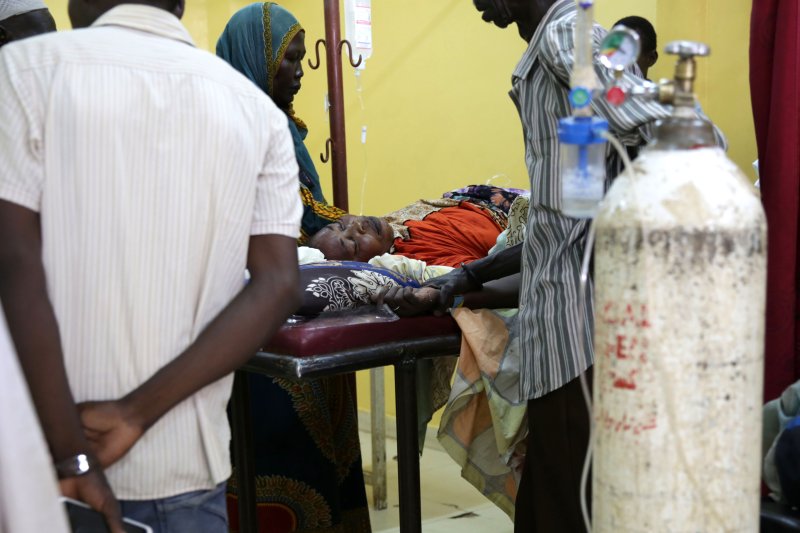Sudanese people wait to receive treatment at a hospital as several doctors join a "Civil Disobedience" campaign, in Omdurman, near Khartoum, Sudan. Photo by EPA-EFE
June 12 (UPI) -- The United States appointed the head of a new special envoy to Sudan Wednesday as opposition forces report dozens of people have been raped and over 120 people have been killed following last week's military crackdown on protests.
The State Department said in a statement it appointed Ambassador Donald Booth to head a special envoy for Sudan to lead "U.S. efforts to support a political solution to the current crisis that reflects the will of the Sudanese people."
Booth, who served as U.S. special envoy for Sudan during the Obama administration, was dispatched to accompany Assistant Secretary for African Affairs Tibor Nagy to meetings on Wednesday and Thursday.
Nagy was dispatched Monday by the State Department to speak with leaders of the ruling Transitional Military Council and Forces for Freedom and Change to "call for a cessation of attacks against civilians and urger parties" to return to talks.
The opposition Sudanese Professionals Association said Wednesday that its leaders met with the envoy and agreed that the power of the country should be transferred to civilian rule, welcomed Ethiopia to continue mediations between the two parties, hold the military responsible "for the massacre" and to begin an international investigation commission for fact-finding to bring the perpetrators to justice.
They also agreed that the military should vacate residential areas, immediately release political detainees and lift a ban on internet access.
Meanwhile, United Nations experts Wednesday called the situation in the country a "human rights abyss," uring the Human Rights Council to establish an independent investigation into human rights violations being committed against protesters.
"Given the scale and seriousness of the reported human rights violations and the need to act quickly to prevent further escalation, we call on the Human Rights Council to establish an independent investigation into the human rights violations in Sudan and actively monitor developments on the group," the U.N. experts from five countries said in a statement.
The increase in U.S. involvement in the Sudan crisis comes as the death toll continues to climb following the military's crackdown June 3 on a sit-in protest demanding for civil rule.
The military has been under pressure from the opposition Forces of Freedom and Change to hand over power of the country to civilian rule since it ousted dictator President Omar al-Bashir from the country's helm on April 11.
Following weeks of sit-in protests outside the military headquarters in the capital Khartoum, the military conducted a pre-dawn attack on the demonstrators June 3 that nullified all existing agreements between the two sides and prompted the opposition to stage a massive general strike that brought the country to a standstill.
Approximately 35 people were killed in the first day of the crackdown and the death toll has steadily increased to 129 with hundreds injured, the Central Committee of Sudan Doctors said.
On Monday, 118 people were reported dead but that number jumped after nine people were killed "by live bullets and stick beatings of [the Sudanese paramilitary Rapid Security Forces]," the doctors group said Wednesday, adding that the cause of the two other deaths could not be confirmed.
The doctors group, which is a main member of the opposition, said at least 70 people have been raped by military forces, but the number could be higher.
On Tuesday, Ethiopian mediator Mohamound Dirir convinced both sides to return to the negotiating table over constructing an interim government to de-escalate tensions.
In a press conference, he said the ruling TMC "agreed to take confidence-building measures including the release of political prisoners" while the FFC "agreed to call off the civil disobedience [general strike]," the Sudan Tribune reported.
The FFC announced a temporary halt to the three-day strike starting Wednesday but informed communities to be prepared for it to start up again.
Meanwhile, Human Rights International demanded that the TMC restore access to the internet as banning the service is a violation of human rights.
"If the Transitional Military Council genuinely intends to restore peace and maintain goodwill with civilian opposition leaders, it should reverse this dangerous shutdown, which puts even more lives at risk," Human Rights Watch's acting emergencies director Priyanka Motaparthy said in a statement. "These shutdowns blatantly repress the rights of the people the military council claims it wants to have a dialogue with."
Activists first began reporting shutdowns the day of the crackdown, preventing activists from reporting critical information about the situation in Sudan, the international rights organization said.
"No one is going to believe that a government that has repeatedly blocked this crucial avenue of communication is otherwise dealing with protesters in a proportionate, rights-respecting manner," Motaparthy said. "There is simply no legitimate justification for this overboard measure that is designed to repress the exercise of fundamental rights."















